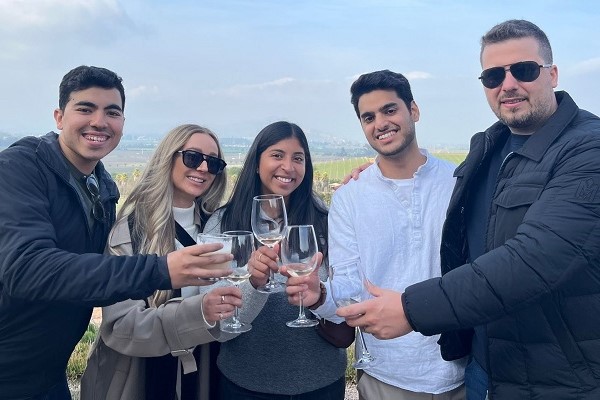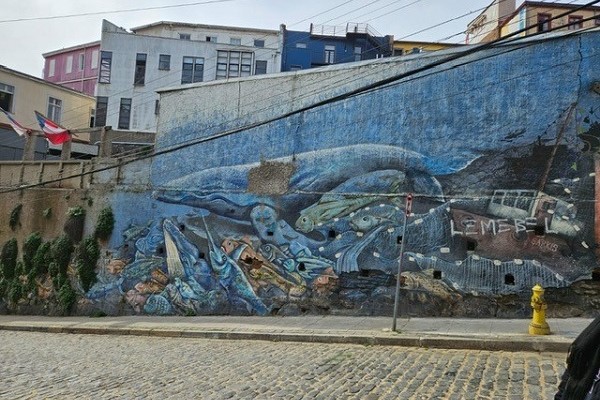Sarah Batchelor and Ayoub Zahir are AMBA ’24 candidates who recently travelled to Santiago, Chile as part of the Ivey Accelerated MBA (AMBA) International Study Trip. Batchelor is a strategist and problem-solver, with a particular focus on complex, regulated challenges including sustainability and tech. Zahir is a technologist passionate about leveraging technology to drive innovation in business and create global impact. In their blog below, they reflect on their experiences from the trip.
Ten days in Chile provided the AMBA ’24 class with rich experiences as diverse as the landscapes that make up the world’s longest country. The diversity in geography – from the high peaks of the Andes mountains to the dry Atacama Desert and the beaches of Viña del Mar – provides an appropriate metaphor for the complex and diverse challenges and opportunities within the nation. Despite a heavy reliance on extractive industries, we saw a clear and unwavering commitment to sustainability across all industries. Additionally, despite statistics showing relatively high inequality (compared to countries with similar levels of development), we saw a thriving entrepreneurial environment that breeds opportunity. The in-depth look at the unique culture, economy, and people of Chile provided us with both a deeper appreciation and understanding of Latin American business and important insights to take back home.
Exploring Chile’s history and cultural landscape
The study tour began with an immersion in local culture through a walking tour of Santiago. We heard directly from locals and saw firsthand how their rich and complex history – from the early neoliberal influences, to overcoming the Pinochet dictatorship and finally recent constitution referendums – has shaped the Chile of today.
We also saw this history reflected in the nation’s creative side. A walking tour along the winding streets of Valparaíso let us explore the vibrant and colourful street art murals that depicted the political and cultural context of the country (the historic quarter here is a UNESCO world heritage site). One of our favourite murals featured a colourful oceanscape, illustrating the importance of the ocean and environmental preservation to the city.
These cultural experiences helped us to understand how Chile differs from Canada as well as from other Latin American nations, and to appreciate Chile’s unique and rich nuances.
Prioritizing sustainability
Chile relies heavily on extractive industries to fuel economic growth, including mining, forestry and fishing, with the mining sector alone accounting for approximately 10 per cent of Chile’s gross domestic product.
Despite this reliance, there is a clear focus on sustainability and environmental conservation that was apparent in almost every meeting, presentation, and experience we had on the tour.
During presentations with Chilean chemical company Sociedad Química y Minera, automobile distributor Inchcape Chile, and Glocalminds Founder Pablo Villoch, we learned about Chile’s progressive regulatory landscape. This includes incentivizing renewable energy (and phasing out coal-fired power plants) and increasing sustainability and innovation in mining. Beyond policy, we also saw sustainability as a core value of the people and businesses of Chile, including driving sustainable innovations forward, like Quelp, a seaweed-based food company poised to disrupt plastic packaging.
As the world's largest producer of copper, a major producer of lithium (third-largest lithium reserves), and rich in renewable energy resources including vast solar and wind opportunity, Chile is also an important enabler in a more sustainable global future. These resources will be critical in supporting global supply chains of renewable energy technologies, electric vehicles, and energy storage infrastructure.
By deepening our understanding of the innovation happening in Chile to balance economic demands with environmental protection, we learned ways to improve collaboration and unlock future opportunities to grow these emerging economies and meet our climate goals.
Think global, act local
We were also introduced to the Chilean startup ecosystem through presentations with local entrepreneurs and venture capitalists, where we witnessed firsthand the bright local talent. Their innovation often led them to create great products that not only solved problems for the Chilean market, but also expanded to the rest of the Hispanic Latin America.
During our meeting with Chilean Venture Capitalist Claudio Barahona, he highlighted the importance of understanding and capturing the local market characteristics as a key success factor for startups before expanding outside of Chile. This was perfectly summarized in his key takeaway for innovation and startups in the Chilean market: “Think global and act local.” This mentality was brought to life through a strong sense of social entrepreneurship, with many Chilean-founded businesses using technology to solve broader, global societal issues.
Building lifelong amigos (friends)
Some of our favourite memories from the trip are the moments shared with classmates exploring the country. This included visiting the Concón Dunes and the Bahá'í Temple of South America, sampling Pisco Sours (a local specialty cocktail) and so much more.
One of these notable moments was visiting the Kingston Family Vineyard in the Casablanca Valley. Back in Toronto, our class studied a growth case on the vineyard, so seeing the actions the owners took and hearing from co-founder Courtney Kingston about the real-life impact of the decision in the case was a highlight. Being able to take the classroom learning and see the tangible, real-world application was so much more meaningful (and delicious – if you are ever in Chile, you should visit their vineyard and restaurant).
The importance of experiential learning from of the trip is best articulated by Fabriela Mistral, a beloved local Chilean Nobel Laureate and educator: “Teach always, in the courtyard and on the street, as well as in the classroom.” The immersive experiences from our time in Chile have provided us with new perspectives that we will take back to the program as well as our various industries and careers.

Enjoying drinks at Kingston Vineyards

Street art in Valparaíso, Chile



